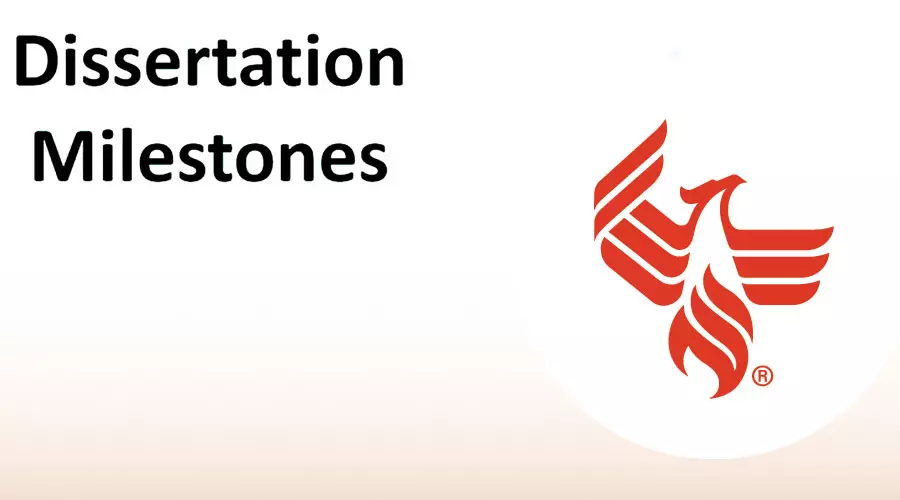- Two Content Program Courses (8 weeks each)
- DOC/741 (8 weeks) Doctoral Seminar III
- Deliverable: Proposal Chapters 1-3 – Checkpoint Phase Deliverable
College of Doctoral Studies
Dissertation Journey
Welcome to your doctoral journey! We’re so proud that you’ve decided to take this step in your career. Our mission is to develop doctoral leaders who conduct research for creative action and provide guidance to diverse organizations through effective decision-making.
Watch: Doctoral Demeanor

Watch Doctoral Demeanor video.
The Dissertation Process
The dissertation process occurs in five phases. Students should use the courses in each phase to build upon each phase deliverable and can dovetail course materials from content and research courses. Students should download a copy of the College of Doctoral Studies Dissertation Guide and Alignment Handbook for further alignment support.
The five phases are:
- Prospectus
- Précis
- Concept Review
- Quality Review Methods (QRM): Proposal
- Institutional Review Board (IRB) Approval, Quality Review Final (QRF): Dissertation, and Oral Defense
Watch: Embracing Feedback

Watch Embracing Feedback video.
Watch: Dissertation Milestones

Watch Dissertation Milestones video.
Select the phase you would like to review
Dissertation Committee Roles
Watch: Dissertation Committee Roles and Responsibilities
Students enrolled in the College of Doctoral Studies at the University of Phoenix are expected to be dedicated, self-motivated, responsible, and independent learners accountable for the development of their dissertation. Doctoral faculty members are dedicated to supporting and guiding students to the completion of the doctorate.
Doctoral seminar courses are writing-intensive classes for students. The faculty provides guidance, review, and feedback on dissertation deliverables to support the student in building a quality, robust dissertation. Students should be in doctoral seminar classes for full reviews.

Watch Dissertation Committee Roles and Responsibilities video.
Students who selected their own committee members prior to September 2019, will continue to work with those faculty members. If a faculty member resigns or students wish to change a faculty member, students will be assigned a staff faculty member. There are situations where changes in dissertation committee faculty may delay student progression based on new faculty feedback and incomplete student documents.
Watch: Ensuring Consistent Progression Through the Doctoral Journey
Phase 1: Prospectus (Outline of the Planned Dissertation Study)
Tools for Success
About
In Phase 1 of the dissertation journey, doctoral students embark on coursework designed to help them develop a researchable topic and problem aligned with their degree and career goals, emphasizing the importance of leadership skills. During the course DOC/714S, students work with faculty members and classmates to refine their research problem, methods, and design, gaining a foundational understanding of how to align the problem statement, purpose, and research methodology. This phase also encourages students to start informal discussions with potential organizations to gauge interest and understand any necessary permissions, while aligning with one of the UOPX Research Centers. The process of dovetailing, or using assignments from previous courses to further develop their topic, is encouraged, enabling a coherent and progressive elaboration of their research over the entire program.
Courses
Recommendations in the dissertation process
Topic Selection
The initial step in achieving dissertation alignment is selecting a topic aligned with the program of study, also referred to as the industry or discipline of study. The topic should reflect an existing problem within the industry. The following information provides brief examples of dissertation topics that align with the various practitioner programs currently offered at University of Phoenix doctoral studies.
Phase 2: Précis (Draft of Chapter 1)
Tools for Success
About
In Phase 2 of the dissertation journey, doctoral students focus on refining key elements of their dissertation, such as problem and purpose statements, and aligning their research methodology and design with Chapter 1, the Précis, while also outlining Chapter 2 topics. At this stage, students are assigned a Dissertation Chair and a University Research Methodologist (URM), with whom they will collaborate closely to achieve final approval of their research triad. This collaborative effort emphasizes the integration of coursework into the dissertation research and the importance of preparing for Institutional Review Board (IRB) approval by establishing connections with potential research organizations and accessing IRB submission resources. Précis approval from the Chair is needed to move to the next phase.
Courses
Recommendations in the dissertation process
Phase 3: Concept Review (Draft of Chapter 2: Literature Review)
Tools for Success
About
In Phase 3 of the doctoral journey, students work closely with their Chairs and University Research Methodologists (URMs) to refine their dissertation's foundational elements, particularly focusing on developing a comprehensive Literature Review in Chapter 2. They are encouraged to use resources such as the SAGE Project Planner for guidance on organizing and writing the literature review with an emphasis on critique, analysis, and synthesis of relevant literature. This phase also includes the completion of the Human Subjects Protection training, a crucial step for ethical research, resulting in a CITI certificate valid for two years. Through the DOC/723 course, students focus on drafting and refining their Concept Review or Chapter 2, incorporating prior research and coursework to strengthen their dissertation framework. Concept Review approval from the Chair is need to move to the next phase.
Courses
Recommendations in the dissertation process
Phase 4: QRM: Proposal (or Chapters 1-3)
Tools for Success
About
In Phase 4 of the doctoral journey, doctoral students aim to gain approval for their dissertation proposal, which includes Chapters 1-3, in the writing-intensive course DOC/741. During this phase, students receive crucial guidance, reviews, and feedback from their Dissertation Chair and University Research Methodologist (URM) to develop a high-quality dissertation proposal. Should students not achieve approval in DOC/741, they are required to enroll in DOC/741A and DOC/741B to refine their proposals. Upon approval by the Chair and URM in TK20, students advance to Phase 5 and are eligible to submit their IRB applications. Students are encouraged not to wait for dissertation proposal approval before completing their IRB application and securing site and data use permissions, but rather to work on these concurrently throughout Phase 4.
Courses
Recommendations in the dissertation process
Phase 5: IRB Approval, QRF: Dissertation (Chapters 1-5), and Oral Defense
Tools for Success
About
In Phase 5 of the doctoral journey, following approval of the dissertation proposal by the Dissertation Chair and University Research Methodologist (URM) in Phase 4, students move forward with submitting their application to the University of Phoenix Institutional Review Board (IRB). The IRB oversees a Human Research Protection Program dedicated to safeguarding the rights and welfare of volunteers participating in research conducted by the University's faculty, students, and staff. Once IRB approval is obtained, doctoral students are cleared to commence data collection. To end the phase, doctoral students will need dissertation and Oral Defense approval.
